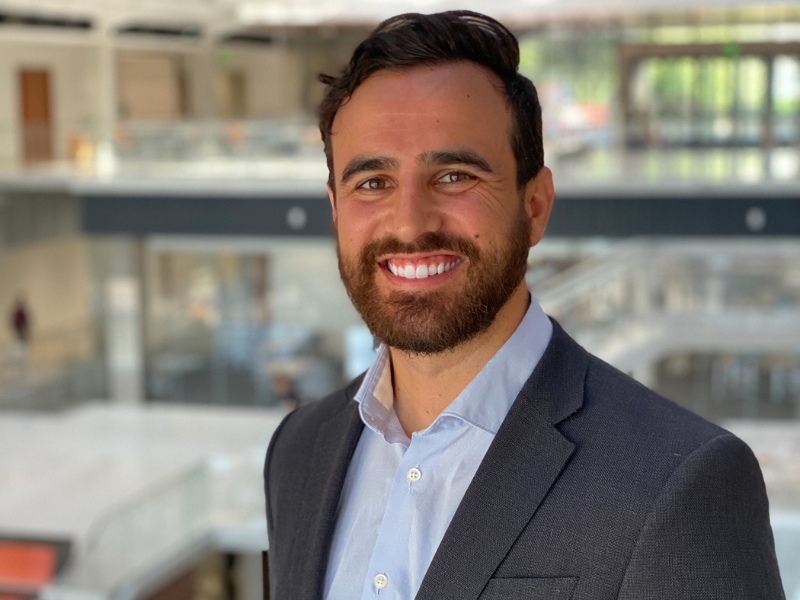In the last month, Joaquin Resasco has won the Young Investigator Award from the Society of Hispanic Professional Engineers (SHPE) and was recognized as part of the American Institute of Chemical Engineers’ 35 Under 35 group (AIChE).

Resasco joined the Cockrell School of Engineering’s McKetta Department of Chemical Engineering faculty in 2021, coming over from University of California Santa Barbara. His focus is on catalysis, which is key to producing fertilizers, converting oil into gas and removing pollutants from the air. His research aims to use catalysts to advance sustainable technologies.
Learn more about Resasco’s and his work in the interview below.
You’ve received a lot of recognition lately with recent awards from SHPE and AIChE, what impact will that have on you and your work?
I feel honored to have been chosen for these awards. The AIChE 35 under 35 is a group of incredible scientists who are pushing the boundaries in their respective areas, so I am delighted to be a part of that group. The Young Investigator Award from the Society of Hispanic Professional Engineers is also a special honor. UT has a large population of extremely talented Hispanic students so I hope that awards like this one, which highlight the accomplishments of our Hispanic faculty on campus will help inspire these students as they pursue their own goals.
You’re focused on catalysis. Tell us more about that and why you choose that field?
My parents have always been my role models. My father is a professor of chemical engineering whose research is also in catalysis. My mother also teaches at the university level. I guess the apple doesn't fall far from the tree!
What are some of the big challenges in the world that you’re trying to solve through your engineering work?
I’ve always been passionate about environmental preservation. I love spending time in nature, especially in the mountains. I always wanted to work on science that helped reduce the impact that we have on these beautiful places. Realizing that catalysis could play an important role in enabling a more sustainable future is what really got me excited about it.
So, what is catalysis? It is the field focused on the study of catalysts – special materials that speed up chemical reactions. Catalysts are all around us, and in fact play a necessary role in making life possible. Our bodies use biological catalysts, called enzymes, to perform vital functions. Synthetic catalysts similarly play an essential role in our daily lives. They're involved in nearly every stage of converting raw materials, such as fossil feedstocks, into the products we rely on, including fuels, plastics, clothing, and medicines.
However, our current reliance on processes fueled by fossil sources is far from environmentally sustainable. It turns out that just like industry today relies on catalysis, transitioning to a greener future will require more advanced catalytic materials. Whether it's finding new ways to find value in plastic waste, producing sustainable fuels from renewable resources like biomass, or efficiently storing energy derived from wind and solar power, the key to achieving these goals lies in developing better catalysts. So that is what my group works on at UT: understanding and developing catalysts for chemical reactions related to sustainability.
You joined UT in 2021, what drew you here?
UT has a long history of excellence in chemical engineering that continues today. I was excited to join a faculty with such great scientists that also felt welcoming and supportive. The fact that the university was in a great city like Austin made the decision even easier.
What advice would you give your colleagues still going through their degree processes who want to become professors?
The academic path has a fair share of rejections: you don’t get into the Ph.D. program you wanted, your experiment fails, your paper is rejected, and so on. But I think that something that helps you weather these setbacks is feeling like there is a sense of purpose to what you are doing. This sense of purpose can come both from working on a scientific problem you are passionate about and from teaching these ideas to others. So, my advice would be to occasionally step back and try to get in touch with your values and larger sense of purpose.
Original article appeared on Cockrell School of Engineering website.






